Curriculum
The UHS Way
A Gold Standard Curriculum for All
The UHS Way ensures all colleagues are committed to educating, inspiring and motivating young people to become successful global citizens.
Our ‘gold standard’ curriculum provides a rich balance of knowledge, skills and cultural capital to reflect the needs of our diverse students and local community. While academic study is at the core of our curriculum, it is enhanced and deepened by our exciting range of wider curricular, enrichment and extension opportunities. The impact of this is that all of our students develop experience, understanding, creativity and curiosity.
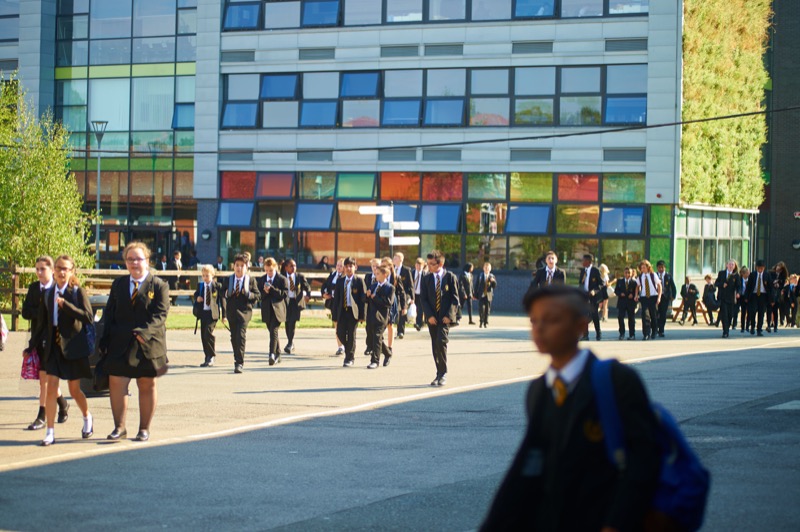
We prepare our students for life in modern Britain and as future global citizens. All aspects of life at UHS contribute to the personal development and education that our students receive. We provide comprehensive and impartial advice, so students are confident to choose routes in further and higher education, training and the world of work.
At UHS we are proud of all aspects of our diversity and recognise that students join us with different backgrounds, experiences and needs. The design and delivery of the curriculum places students at the centre of their learning and is designed to ensure that all students ‘see themselves’ in their everyday curriculum. We ensure that the curriculum challenges students to work independently, develop excellence and make connections across subjects and content. Thus emphasising character traits such as resilience, as well as encouraging ambitious attitudes and risk taking in order to become confident thinkers.
Equality of opportunity for all students is integral to our curriculum purpose. Students with gaps in their prior knowledge or special educational needs will receive bespoke, additional support through our flexible learning centre, small group intervention and within quality first adaptive teaching in mainstream classrooms. We recognise that early action to address gaps in skills and knowledge during the initial secondary years, will ensure that all students can succeed.
“To be part of an amazing school like this, you have a to be PROUD. These values are part of everything we do and we are positive, respectful, open minded, unique and determined at all times. I feel so lucky to be at this school.”
- Mariam Razaie – Year 7
Curriculum design and delivery
CURRICULUM PRINCIPLES
When designing and reviewing our curriculum, we adhere to key principles to ensure a quality first approach and to ensure consistency across curriculum areas.
Our curriculum:
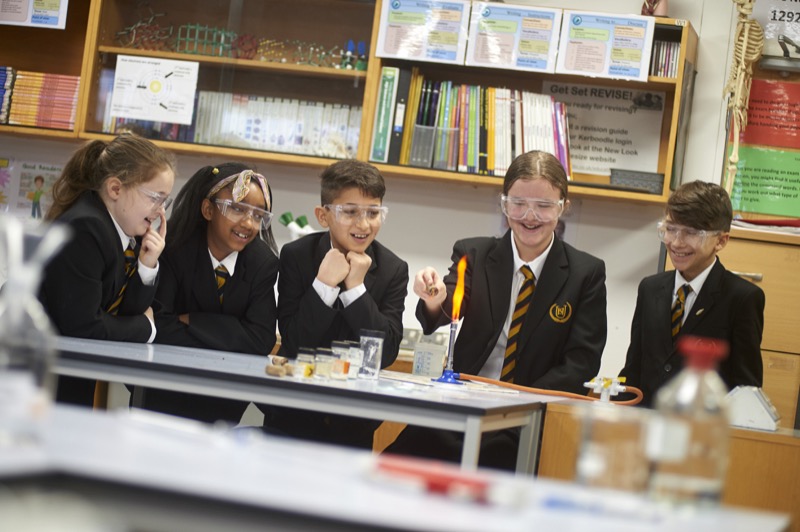
- involves an ongoing process of development. This is the responsibility of all teaching staff, led by curriculum leaders and overseen and supported by senior leaders, through the allocation of sufficient time and resources for evaluation;
- has 7-year curriculum maps, from Year 7 to Year 13, which are clearly defined to enable progression, including substantive and disciplinary knowledge over time. This begins at Key Stage 3, where students work towards key objectives which they aim to secure by the end of each year, based on their pathway;
- encourages both breadth and depth, throughout all courses, with an appropriate allocation of learning time and full coverage of the national curriculum;
- is built on research based pedagogy which instils a powerful combination of both knowledge and skill, delivered through the right balance of guided and independent practice, thus equipping students for aspiration and success in their learning and future lives;
- encourages students to acquire, retain and effectively recall knowledge. This is based on building student’s resilience as self-regulators by developing their independence;
- includes appropriate time given to developing a love of reading, literacy and numeracy to ensure that all students can access the full curriculum and have the essential skills needed for life;
- develops student’s vocabulary in all curriculum areas, such as the teaching of tier 2 and 3 vocabulary, contributing to improved oracy and literacy outcomes, ensuring students use spoken and written language to communicate effectively;
- uses a range of formative and summative assessment that is appropriate to each subject, thereby allowing teachers and parents to monitor students’ learning using the DPR (KS3) and Pupil Progress Tracker (KS4 and KS5) and identify and target individual next steps;
- is adaptive to all learners where careful consideration has been given as to the support needed for every individual student;
- expands students’ perspectives and celebrates difference through a range of spiritual, moral, social and cultural opportunities to promote their sense of moral and social responsibility. Students are able to ‘see themselves’ in their curriculum;
- includes a comprehensive programme of trips, visits and wider-curricular activities to support the curriculum and encourage student’s talents and interests;
- provides an appropriate range of opportunities and experiences to inspire students to succeed in the next stage in their education, training or employment.
“Teachers don’t keep us waiting to give feedback, we’re always finding out in lessons how to improve and move on to the next level.”
- Binyamin Hussain Year 11
KEY STAGE 3
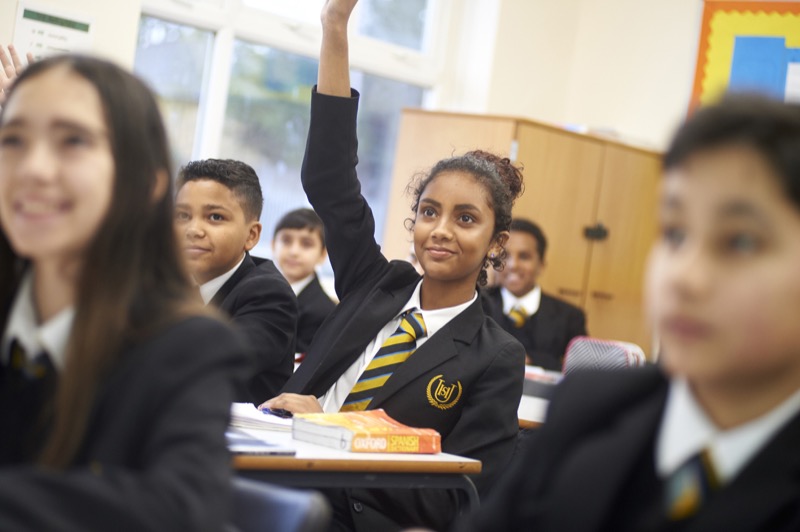
During Years 7, 8 and 9 students develop and build upon their learning from primary school. Their experiences are enriched across a wide range of subjects, all of which are considered to be of equal importance.
We recognise that students’ learning during these years provides the building blocks they need to be successful learners and confident thinkers. The design and delivery of lessons reflects abilities and starting points. The content covered provides challenge, breadth and depth to engage students and engender a passion for learning. We recognise that students will start to form interests in specific subjects and actively encourage them to harness their enthusiasm beyond the classroom. These foundation years will equip students with the ability to memorise key knowledge, use a variety of different skills to solve problems and make conceptual connections across subjects.
The school has a rigorous approach to the teaching of literacy and numeracy. The importance of reading, writing and speaking is placed at the heart of the foundation years across all subject areas. We expose students to different literature, fiction and non-fiction books to increase their exposure to a wide range of vocabulary and encourage an interest in books and words. Students love being given the opportunities to communicate in a variety of forms and across all subjects. Numeracy skills are embedded into lessons across the curriculum. The design emphasises the importance we place on actively teaching character and culture both during bespoke lessons, events, tutor periods, assemblies and beyond. The specific areas of study and character and culture taught during the foundation years are summarised in the table below:
|
Knowledge, skills and concepts |
Character |
Creating our culture |
|
Art Citizenship and personal development Computer science Design & technology Drama Maths Music English Geography History MFL (French/Spanish) PE RE Science |
Leadership Resilience Organisation Responsibility Problem-solving Communication Co-operation Curiosity Self-regulation Social intelligence Critical thinking Team work |
Positivity Respect Open-mindedness Uniqueness Determination
|
During Year 9 students continue to complete the Key Stage 3 curriculum, with added ambition to transition towards mastering the knowledge and skills required to gain GCSE or vocational qualifications. This means that all students will continue to study a breadth of subjects covering the arts, languages, humanities, computing and design technology through to the end of Year 9, but also have the opportunity to begin to specialise and gain the depth of understanding required to gain future qualifications.
"In class, I see lots of participation around me and we feel keen to learn. Teachers are passionate about their special subjects and that makes me want to try really hard."
- Emma Barnutiu Year 8
KEY STAGE 4 - Years 10 and 11
The intent of our curriculum is underpinned by our UHS Way which enriches individuals academically, socially and emotionally.
All students follow a core curriculum of mathematics, English language, English literature, science, RE and PE as well as citizenship. During Key Stage 4, students work towards national qualifications – in the main these are GCSE qualifications. However, greater breadth to the curriculum has been provided with additional qualifications: BTEC; NCFE; Cambridge Nationals. These are all equivalent to GCSEs. The curriculum is carefully designed to ensure that all students have the knowledge, skills, cultural capital and qualifications to ensure a smooth transition to Key Stage 5.
We offer a wide range of subjects to ensure all students’ interests are catered for and they will usually study 8 or 9 subjects:
- Art & design;
- Business studies;
- Computer science or creative imedia
- Dance;
- Drama;
- Engineering or design and technology;
- Geography;
- Health and social care;
- History;
- Hospitality and catering.
- Languages;
- Music or music technology;
- Photography;
- Physical education or sports studies;
- Psychology;
- Sociology.
Our options guidance programme ensures that students and their parents are fully aware of the availability and value of certain choices, for example in selecting subjects that contribute to the academic EBacc, vocational subjects and in choosing our highly valued creative subjects, such as art, music, drama and design technology.
During Key Stage 3 and Key Stage 4, students are offered a wide range of careers education and independent advice and guidance to assist them in seeking and securing appropriate pathways Post 16. We aim to accommodate the vast majority of Year 11 students within our sixth form, but appreciate that for some opportunities at colleges or in training, present a more appropriate route.
"I really like the range of future career ideas that are talked about in lessons and assemblies. It helps me to think that what we are learning is relevant."
- Sabor Ahmadi, Year 10
KEY STAGE 5
Post 16: Years 12 and 13
Our advanced programmes of study, include a wide range of academic A-levels and a suite of vocational qualifications at both levels 2 and 3. Students are able to mix and match academic and vocational qualifications to create as bespoke programmes to suit their strengths and aspirations for university and college education, training or employment when they leave us. Students are also involved in an extensive careers and enrichment programme.
The sixth form curriculum provides students with academic and vocational qualifications that are challenging and valued in life beyond UHS. We currently offer the following pathways:
A-level
Art;
English language;
English literature;
Government and politics;
Maths;
Physics;
Psychology;
Business studies;
Chemistry;
Economics;
Biology;
History;
Geography;
Sociology;
Religious education.
Law
Level 3 courses
BTEC sport;
BTEC business;
BTEC performance studies;
BTEC digital music production;
LIBF finance diploma;
Cambridge Technical in ICT.
Students can opt for four A-levels with the option of reducing this to three in year 13. All students applying to our sixth form go through an interview process to ensure they receive appropriate advice to make an informed decision. Students are also offered the opportunity to undertake the Level 3 extended project qualification, beginning in Year 12 and completed in Year 13. This is a research-based project on a topic chosen by the student themselves, and is highly valued by universities and employers alike.
The sixth form curriculum is monitored by the senior leadership team RSL, teaching and learning reviews, and by curriculum leaders via lesson observations; learning walks; work scrutiny; and student voice. The sixth form programmes follow a mastery curriculum with significant formative assessment as well as end of topic formal assessments and three whole school tracking points through the academic year. Staff are working towards a coherent and consistent planned scheme of learning in every subject, which demonstrates how the curriculum is sequenced towards building sufficient knowledge and skills for future learning and destinations.
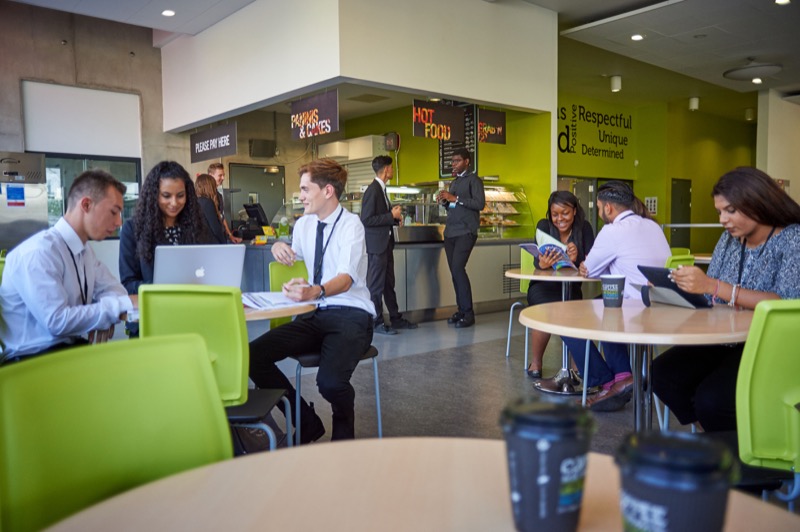
"Teachers plan high quality lessons and make sure that we really do learn. We are building towards the Gold standard, which is something we really feel we can achieve."
- Tia Buckingham Year 13
The Sixth Form Careers and Enrichment Curriculum
The opportunities students are offered outside their academic subjects are extensive. They have opportunities to develop a wide array of skills through experiences they may not have encountered before. Awareness of the local community and the ‘wider world’ is relentlessly encouraged, ensuring that students develop into well rounded, open minded, determined and knowledgeable young adults who can engage with the world around them. Through a comprehensive enrichment programme; impartial careers advice; work experience and an exhaustive list of employability programmes, our learners develop personal, social, employability and independent learning skills.
Our students are also encouraged to undertake voluntary and charity work and participate in projects that will encourage such qualities as perseverance, initiative and leadership. The sixth form also offer a range of awareness courses and briefings including sessions on mental health amongst young people, Safe Drive Stay Alive workshop (Hillingdon Council, London Ambulance Service, MET Police, London Fire Brigade and Transport for London).
We run a ‘speakers programme’ inviting a number of people from commerce, industry, charities and the public sector to talk to our students; e.g. local MPs, professors from universities, employment companies WizeUp, general practitioners (GPs).
Each year a large proportion of our students apply to university. Students are encouraged to aim high and are guided through the application process early in Year 12. Bespoke interview practice is provided in Year 13 for students on application to specific courses.
Our Oxbridge programme aims to provide bespoke and tailored support to Year 12 students who are looking to apply to Oxford, Cambridge, medicine or dentistry. The programme involves a series of sessions spread across the year to equip students with the skills, experience and knowledge of applying to these universities/courses. Each session has its own focus and build on from each other to ultimately leave students ready with a full UCAS application fit for purpose. The initial sessions look at how to find good work experience relevant to the student’s course and signing up to taster courses at the various Oxbridge ad Russell group universities. Sessions include emphasis on writing an outstanding personal statement and then lead into preparing students for interviews. We endeavour to take students to Oxford and Cambridge directly and attend local conferences. It is a chance for candidates to ask questions of current students, to have the application process explained by members of the university’s admissions team and attend talks by tutors and undergraduates from subject specific faculties.
For students who wish to enter employment or further training we encourage them to complete Level 3 to obtain higher level apprenticeships.
"The school helps us to actively explore a big variety of career options and pathways for future study. My teachers are ambitious for me, and this helps me to have high aspirations for myself."
- Harilakshmi Kulasekaran, Year 13
OUR WIDER CURRICULUM
We have a responsibility to ensure that we create opportunities beyond timetabled lessons. Students at our school will take part in a variety of activities which will form life long memories. All aspects of life at UHS contribute to the enrichment of our students’ character. The opportunities that students experience beyond the classroom are valued by all. We pride ourselves on ensuring students have an understanding that the qualifications they gain open doors, but it is a person’s character that will ensure they shine bright and stand out from the crowd.
We are fortunate to have a beautiful school site with extensive grounds, the Orsino building for the creative arts, the sports dome to harness potential and talent and a history that dates back to 1923. This provides the leaders in the school with a unique privilege to enrich the lives of all the young people that embark on their education with us.
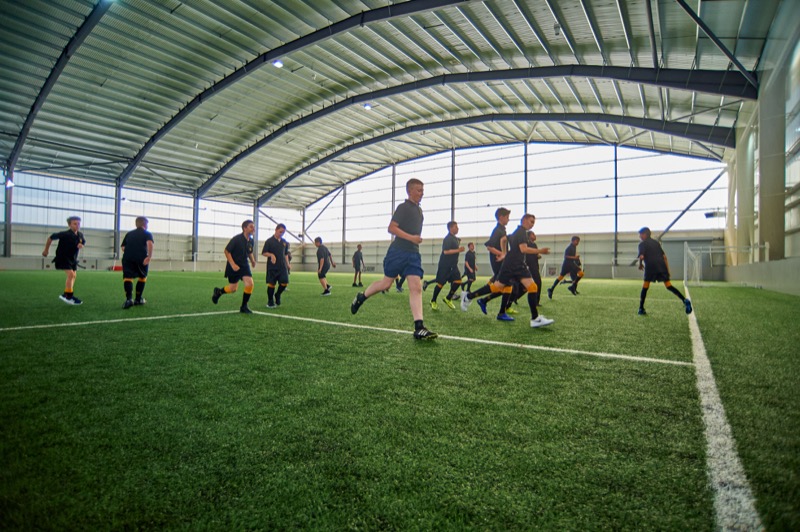
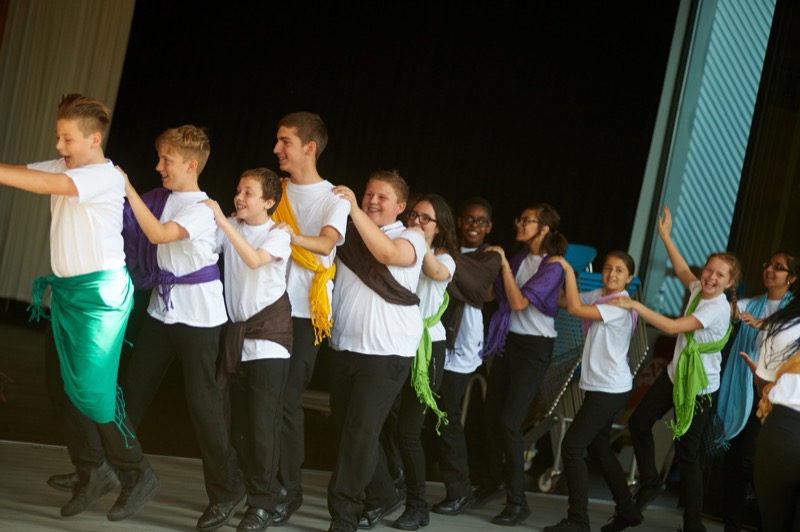
Throughout their life at UHS, students are offered a wide range of extra-curricular, enrichment and personal development opportunities. These are delivered through subjects, our citizenship programme, assemblies, tutor time and the day-to-day life of school. They include a wide range of extra-curricular clubs and activities, trips and visits, special events and opportunities offered through our extensive spiritual, moral social and cultural curriculum. As a London school, we embrace the opportunities presented by this vibrant and cultural city. We particularly promote wider participation in sport, artistic and performance opportunities, cultural events and reflection and opportunities for meaningful employer engagement. This offer is carefully planned to ensure introduction at the appropriate time as students move through the main school and into our sixth form.
The whole curriculum contributes to our students’ wider skills, knowledge and personal qualities. These include for example, working effectively in teams; study skills; developing students’ literacy skills and their love of reading; critical thinking and practical skills. Our students become socially aware, support and respect each other’s differences and harmoniously embrace our PROUD values. Equally, students develop a strong awareness of how they can stay safe online, safe within school and in the wider community. Our students enjoy the challenge of assuming leadership opportunities such as representing the student body through school council membership or captaincy of the school, houses and sports teams. We are proud of our students’ achievements both in school and in the wider community.
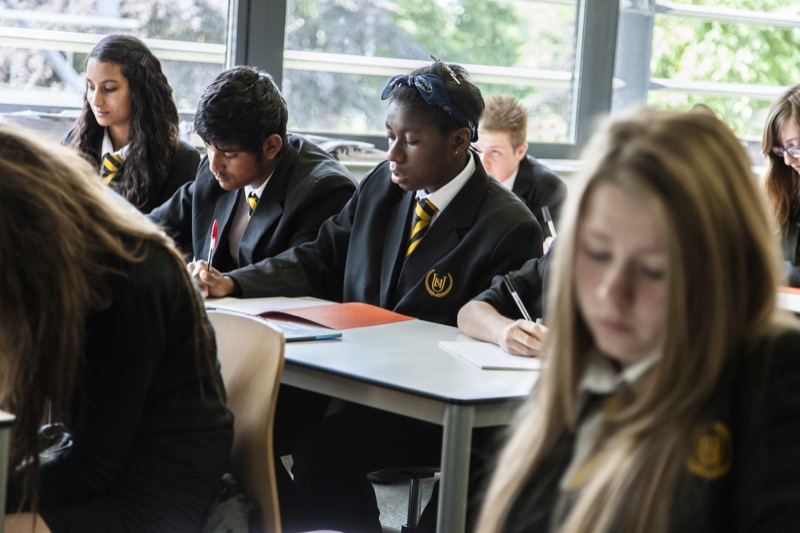
As a school we observe Internet Safety Day and follow the theme outlined by them. Slides on how to stay safe online are displayed on the screens around the school, all year round. The school website also syndicate content from 'ParentInfo' which have all the latest and most up to date safeguarding themes surrounding e-safety. This information is also communicated to parents via the school newsletter and in the curriculum for students.
Year 7 - e-safety looks at the difference between personal and non-personal data. They identify how to stay safe online and what they would do if they saw something they weren't comfortable with online. In the Autumn 2 term we revisit the theme again, where students create a leaflet after watching one of the CEOP videos. When studying the internet and web awareness, students also look at safe and responsible ways to use the internet, who could be watching you online and security risks.
Year 8 - students follow the unit - Computer Crime and Cyber Security. This unit aims to teach students about the risks of email scams, hacking, protecting personal data, issues with copyright and health and safety when using a computer or electronic device.
Year 9 - as part of their 'Technology of the Future' project, students must think of the social problems and ethical issues that occur with the advancement of technology. For example, what impact will there be if we use our phones too much.
In Key Stage 3 lessons we use the NSPCC/ThinkUKnow Band Runner game and TeachICT E-Safety quizzes as starters.
Our students enjoy the challenge of assuming leadership opportunities such as representing the student body through school council membership or captaincy of the school, houses and sports teams. Student leaders from Years 10 and 11 also have an opportunity to become prefects and through this role they can lead whole school events as well as give back to their school community. In addition to leadership, our carefully planned character education programme encourages all students to continuously build upon selected character traits. Students learn the value of good communication; life-long resilience; how to organise themselves and others and the importance of taking an initiative, all of which, are delivered through termly assemblies and weekly form time sessions. Students are then given the freedom to reflect and plan which attributes they would like to focus on throughout the year. Individual students' successes are documented through their self-evaluations on the ‘PiXL Edge’ programme as well as their participation and their organisation of a wide range of activities, such as ‘UHS take-over days’; charity events; house assemblies and competitions. Many students also volunteer to take on additional roles within the school. Together with our mental health ambassadors, our anti-bullying ambassadors lead a daily reflection space and are armed with the confidence and skills to promote a positive school environment.
We are proud of our students’ achievements both in school and in the wider community. Students are rewarded for their commitment to developing their character regularly through the achievement of PROUD badges, certificates and prizes. Students who excel also earn entry into rewards lunches and trips.
The UHS Way –We develop the whole student in a safe, inclusive and supportive environment. We nurture students’ ambitions ensuring all are PROUD of their success.
